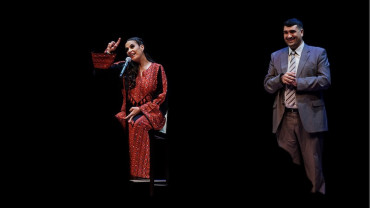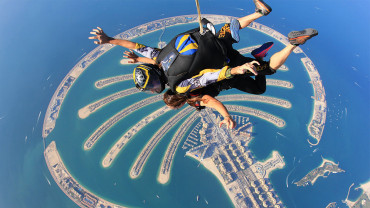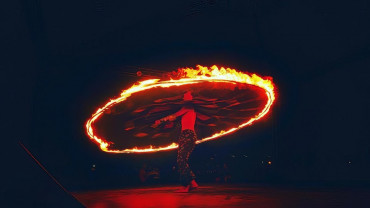Grammy-award-winning Catalan-Spanish conductor and musician Jordi Savall vividly performs the finest music of the Spanish Golden Age alongside his vocal ensembles La Capella Reial De Catalunya and Hespèrion XXI in this exquisitely crafted program spanning 500 years of Arabic cultural and historic roots in Andalusia.
Biographies
JORDI SAVALL
“Jordi Savall testifies to a common cultural inheritance of infinite variety. He is a man for our time” (The Guardian)
Jordi Savall is one of the most versatile musical personalities of his generation. For more than fifty years, he has rescued musical gems from the obscurity of neglect and oblivion and given them back for all to enjoy. A tireless researcher of early music, he interprets and performs the repertory both as a gambist and a conductor. His activities as a concert performer, teacher, researcher, and creator of new musical and cultural projects have made him a leading figure in the reappraisal of historical music. Together with Montserrat Figueras, he founded the ensembles Hespèrion XXI (1974), La Capella Reial de Catalunya (1987), and Le Concert des Nations (1989), with whom he explored and created a world of emotion and beauty shared with millions of early music enthusiasts around the world.
With his key participation in Alain Corneau’s film Tous les Matins du Monde (awarded the César Cinema Prize for the best soundtrack), his intense concert activity (about 140 concerts per year), his record releases (6 recordings per year) and the creation in 1998, together with Montserrat Figueras, of his own record label, Alia Vox, Jordi Savall has shown that early music does not have to be elitist, but rather that it appeals to an increasingly wide and diverse audience of all age groups.
Jordi Savall has recorded and released more than 230 discs covering the Medieval, Renaissance, Baroque, and Classical music repertories, with a special focus on the Hispanic and Mediterranean musical heritage, receiving many awards and distinctions such as the Midem Classical Award, the International Classical Music Award, and the Grammy Award. His concert programmes have made music an instrument of mediation to achieve understanding and peace between different and sometimes warring peoples and cultures. Accordingly, guest artists appearing with his ensembles include Arab, Israeli, Turkish, Greek, Armenian, Afghan, Mexican and North American musicians. In 2008 Jordi Savall was appointed European Union Ambassador for intercultural dialogue and, together with Montserrat Figueras, was named “Artist for Peace” under the UNESCO “Good Will Ambassadors” programme.
Between 2020 and 2021, to mark Ludwig van Beethoven’s 250th anniversary, he conducted the complete symphonies with Le Concert des Nations and recorded them in 2 CDs entitled Beethoven Révolution. The impact they have had in the record market worldwide has been defined as “a miracle” (Fanfare), and volume II has been distinguished with the Schallplattenkritik Prize for the best orchestral record.
Jordi Savall’s prolific musical career has brought him the highest national and international distinctions, including honorary doctorates from the Universities of Evora (Portugal), Barcelona (Catalonia), Louvain (Belgium), and Basel (Switzerland), the order of Chevalier de la Légion d’Honneur (France), the Praetorius Music Prize awarded by the Ministry of Culture and Science of Lower Saxony, the Gold Medal of the Generalitat of Catalonia, the Helena Vaz da Silva Award and the prestigious Léonie Sonning Prize, which is considered the Nobel prize of the music world. This year, he has been elected an Honorary Member by the Royal Philharmonic Society, the Royal Swedish Academy of Music, and la Accademia Nazionale di Santa Cecilia.
La Capella Reial de Catalunya
Following the model of the famous Medieval “royal chapels” for which the great masterpieces of both religious and secular music were composed on the Iberian Peninsula, in 1987 Montserrat Figueras and Jordi Savall founded La Capella Reial, one of the first vocal groups devoted to the performance of Golden Age music on historical principles and consisting exclusively of Hispanic and Latin voices. In 1990, when the ensemble received the regular patronage of the Generalitat of Catalonia, it changed its name to La Capella Reial de Catalunya.
The newly-formed ensemble specialized in the recovery and performance of historical principles of the polyphonic and vocal music of Spain and Europe from the Middle Ages and Golden Age up to the 19th century. La Capella Reial de Catalunya shares with Hespèrion XXI the same artistic outlook and goals, rooted in respect for the profoundly spiritual and artistic dimension of each work, combining quality and authenticity regarding the style of the period with a careful attention to the declamation and expressive projection of the poetic text.
The ensemble’s extensive repertory ranges from the Medieval music of the various cultures of the Mediterranean to the great masters of the Renaissance and the Baroque. Some of their most celebrated concert programs are the Missa de Batalla by Joan Cererols, Vespro della Beata Vergine by Claudio Monteverdi, the Cantigas of Alfonso X (the Wise), El Llibre Vermell of Montserrat, Sephardic songs, the music of The Elche Mystery Play, the ballads from Miguel de Cervantes’s Don Quijote, the Cancioneros del Siglo de Oro (the Songbooks of the Golden Age) and Mozart’s Requiem. Recently, the group has also performed and recorded J. S. Bach’s Saint Mark’s Passion, Handel’s Messiah, Vivaldi’s Oratorio Juditha Triumphans, J.S. Bach’s Christmas Oratorio, and Joseph Haydn’s The Creation, which has won international critical acclaim.
The group has distinguished itself in various Baroque and Classical opera repertories, as well as in contemporary works by Arvo Pärt. The Capella Reial de Catalunya played on de Jacques Rivette’s soundtrack of the film Jeanne La Pucelle (1993) on the life of Joan of Arc.
In 1992, La Capella Reial de Catalunya made their opera debut accompanying all the performances of Le Concert des Nations. They have received various awards and distinctions in recognition of their more than 40 CDs, notably the Midem Classical Award and the Grammy Award. Under the direction of Jordi Savall, La Capella Reial de Catalunya pursued an intense programme of concerts and recordings all over the world, and since the ensemble’s creation, it has regularly performed at major international early music festivals.
HESPÈRION XXI
With a repertoire between the 10th and 18th centuries, Hespèrion XXI searches continuously for new points of union between the East and West with a clear desire for integration and for the recovery of international musical heritage.
In 1974 Jordi Savall and Montserrat Figueras, together with Lorenzo Alpert and Hopkinson Smith, founded the ensemble Hespèrion XX in Basel to recover and disseminate the rich and fascinating musical repertoire prior to the 19th century with historical criteria and the use of original instruments. The name is Hespèrion means “an inhabitant of Hesperia”, referred in ancient Greek to the two most westerly peninsulas in Europe: the Iberian and the Italian. At the turn of the 21st century, Hespèrion XX became known as Hespèrion XXI.
Right from the beginning Hespèrion XXI set out on a clearly innovative and artistic course that would lead to the establishment of a school in the field of ancient music because they conceived ancient music as an experimental musical tool seeking the maximum beauty and expressiveness in their performances.
Hespèrion XXI’s repertoire includes the music of the Sephardi Jews, Castilian romances, pieces from the Spanish Golden Age, and Europe. The group has published more than 60 CDs and performs concerts for the whole world, appearing regularly at the great international festivals of ancient music.
Event Policies, Terms, and Conditions- The Arts Center at NYU Abu Dhabi is committed to providing a safe and healthy environment for all patrons.
- Entry to the NYUAD Campus is through either the East or West Parking or the Welcome Center.
- Patrons will be required to present a valid ticket to an event at The Arts Center upon entry to the campus.
- As per current Department of Culture and Tourism guidelines a Green Al Hosn is NO LONGER needed to attend public events in Abu Dhabi.
- The wearing of face masks is NO LONGER required in most indoor public places, including campus buildings.
- For access and wheelchair bookings please email nyuad.boxoffice@nyu.edu
How to get there:By car: The Arts Center is easily accessible by car. You can park in the designated area for parking once you arrive.


































































